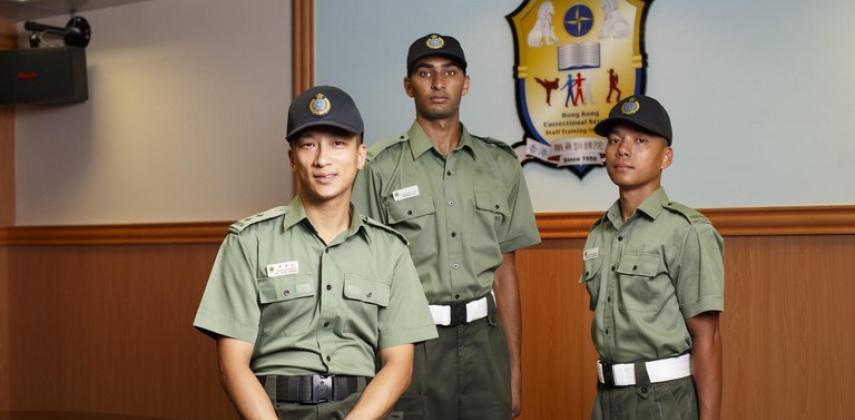The Correctional Services Department is looking for people dedicated to facilitating rehabilitation
The Correctional Services Department (CSD) is actively looking for talent to fill an upcoming void that will be created by the retirement of a large number of staff over the next few years. The department intends to hire 50 officers and 175 assistant officers II (AOII) during the 2013-14 financial year, with the next round of AOII recruitment scheduled to take place in July.
Officer Lee Chun-kwong, training officer at the CSD's Staff Training Institute, says he is looking forward to having candidates with passion and vision join the department. "Work at the CSD can be challenging as staff are in contact with people who are undergoing rehabilitation," he says. "They need to be able to work under pressure. We also want people who are dedicated to protecting society and enhancing public order."
With the department's role of a "society guardian" and "rehabilitation facilitator", a career with the CSD can be extremely meaningful, Lee says. "The department manages several correctional facilities, including facilities for young offenders, prisons and drug rehabilitation centres. The joy and sense of satisfaction of seeing an offender get back on the right track is something only this job can give me," he says.
Officer posts are management positions for applicants with post-secondary qualifications. Officers are responsible for supervising junior staff and may be required to serve in a correctional-service facility.
AOII is an operational position where the main duty is to supervise people in custody. Candidates that have completed secondary school are welcome to apply.
Applicants for both posts need to go through four stages: a fitness test, written tests, a group interview and a final interview.
For the fitness test, candidates are examined on their ability to do sit-ups, shuttle runs, vertical jumps, run 800 metres and put up Bailey bridges.
The written test examines candidates' proficiency in Chinese and English. "Candidates will be given a case and are required to write an essay to explain how they will tackle it," Lee says. "This tests their language skills and critical-thinking skills. There is also an aptitude test and a test on basic law."
For the group interview, candidates will be divided into groups of 10 and take part in a 20-minute-long group discussion. The discussion, which is conducted in Cantonese, will focus on a controversial topic where candidates are required to state their point of view. "This part tests candidates' presentation and leadership skills," Lee says.
For the final interview, candidates will meet with a board of senior CSD staff. "The interview will last for 20 to 30 minutes. I advise candidates to look up information on the CSD website and read news related to the department, as these will contain topics that the board will most likely discuss," Lee says.
Successful candidates will have to complete a training programme before they start work, with the officer programme lasting 26 weeks and the AOII programme 23 weeks. "During training, candidates will learn about laws related to their area of work, as well as criminology, penology, resistance-control tactics, weapons training, self-defence, and many other skills related to their work. Trainees will also be attached to various institutions for field training," Lee says.
One of the toughest things about working for the CSD is that officers need to interact with people in custody. Lee says the department provides full support for staff to do their job. "The job has certain risks but our working environment is perfectly safe because the department has a system and facilities that protect staff in the best possible way," he says.
Several CSD correctional facilities are located in remote areas and staff may have to stay overnight after they have finished work for the day. "Sometimes our staff may not get to go home after their shift and have to spend the night at the facility before starting their next shift," Lee says. "This is often the case for staff that are stationed on outlying islands such as Lantau and Hei Ling Chau. We offer a transport allowance for staff that have to travel to outlying islands for work."
Lee says that the department is dedicated to providing staff with a bright career path. "We very much value career development for correctional personnel and have all along adopted a comprehensive and tactical approach in the management and development of this team," he says. "We arrange timely and appropriate training for officers of different seniority, rank and duties, so as to create a suitable platform for their professional development and pave the way for their future advancement."
Although work at the CSD is challenging, the benefits are rewarding. For example, like other government disciplinary forces, the department's retirement benefits are provided by the Civil Service Provident Fund (CSPF) Scheme. This sees government contributions range from 5 per cent of basic salary for less than three years of continuous service to 25 per cent for over 30 years of service.
As the squad commander at the latest "passing out parade" for new recruits, Lee was excited to see new non-Chinese officers about to start out on their careers. "This year, we have two non-Chinese recruit trainees: one Pakistani and one Nepalese," he says. "Working with non-Chinese staff members at the CSD is not a new thing. There are around 100 non-Chinese staff members currently serving in the department, which demonstrates the CSD's support for racial harmony."


